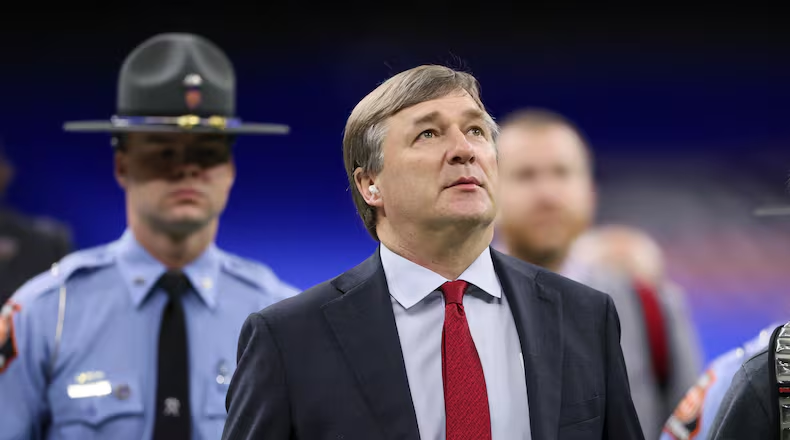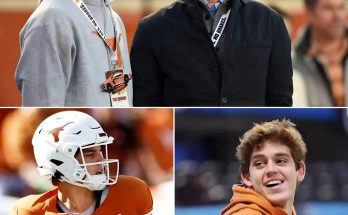Ahead of the House Settlement hearings, Kirby Smart shares his concerns: “Kids will have a difficult ten years.”
Kirby Smart, the head coach of the University of Georgia football team, has long been known for his insightful commentary on the state of college athletics, particularly regarding player welfare and the evolving landscape of college football. As the sport undergoes seismic shifts, including the pending NCAA reforms, Smart recently shared his thoughts ahead of the House Settlement hearings. His warning that “kids will have a difficult ten years” reflects a growing concern among coaches, administrators, and players alike about the long-term effects these changes will have on the student-athletes.
The Changing Landscape of College Sports
For decades, college sports, especially football, have been characterized by a relatively stable system. Athletes were amateurs, and the NCAA maintained strict control over everything from recruitment to eligibility, ensuring a clear distinction between college athletics and professional sports. However, recent years have seen that paradigm begin to crumble. The introduction of the NIL (Name, Image, and Likeness) rights, the expanding role of the transfer portal, and various legal challenges have forced the NCAA to confront its longstanding policies. The result has been a shifting power dynamic where student-athletes are now wielding more influence than ever before.
Kirby Smart’s remarks come in the context of these sweeping changes, and his concern is rooted in the fear that the unintended consequences of these reforms will lead to long-term difficulties for student-athletes, particularly in football. The future Smart envisions is one where players are caught in a whirlwind of shifting policies, increasing pressure, and perhaps even diminished opportunities to truly balance their academic and athletic responsibilities.
The NIL Effect: A Double-Edged Sword
Perhaps one of the most significant changes in college athletics in recent years has been the NIL rights granted to athletes. This reform allows student-athletes to profit from their name, image, and likeness, opening up new revenue streams for them. On the surface, this might seem like a positive development, providing athletes with the opportunity to capitalize on their fame while still in college. However, the reality is far more complicated, and Kirby Smart’s concerns stem from the unintended consequences of this change.
While NIL deals can be incredibly lucrative for some athletes, they create a new set of pressures that may not be fully understood or appreciated by the young men and women involved. College athletes are now expected to juggle their athletic and academic commitments while managing their personal brand, negotiating deals, and navigating a media landscape that was previously foreign to them. The financial temptation can be overwhelming, and the distractions that come with it could detract from the primary focus: the sport itself.
Additionally, NIL creates a disparity among athletes. While some players, particularly those in high-profile programs like Georgia, Alabama, and Ohio State, may be able to secure significant deals, others will struggle to attract any meaningful opportunities. This disparity could lead to a sense of inequity and frustration within locker rooms, as players may feel pressure to compete not just on the field, but in the marketplace.
For coaches like Kirby Smart, the shift in focus is a challenge. As someone who has built a culture of excellence at Georgia, Smart understands that the integrity of the team and the pursuit of championships rely on players working together toward a common goal. However, with the added distraction of NIL deals, Smart worries that some players may become more focused on personal gain than team success, which could have a ripple effect throughout the program.
The Transfer Portal: A Solution or a Problem?
Another major shift in college athletics is the rise of the transfer portal. Initially, the portal was designed to give athletes greater flexibility to find programs that were better suited to their skills and aspirations. However, over time, it has become a frequent means of player movement, with many athletes entering the portal after a single season of limited playing time or when they feel their opportunities elsewhere might be more promising.
While the transfer portal was heralded as a way to empower athletes, it has led to a great deal of instability in college football. Programs now face the constant threat of losing key players to transfer, which makes long-term planning and recruitment increasingly difficult. This lack of stability makes it harder for coaches to build cohesive teams, as roster turnover becomes a frequent occurrence.
Kirby Smart has voiced his concerns about the portal’s impact on the game, particularly in terms of team chemistry and development. The very nature of the portal means that players may be more likely to leave when things don’t go their way, creating an environment where instant gratification takes precedence over long-term commitment. This shift poses a problem for coaches who emphasize player development and want to foster loyalty and team cohesion.
The Mental Health Strain
With the increased pressure of NIL deals, the unpredictability of the transfer portal, and the sheer physical demands of playing college football, Smart’s prediction that “kids will have a difficult ten years” is rooted in a concern for their mental health and well-being. The rigors of college football, combined with the pressures of academics, social media, and financial incentives, are causing many athletes to experience heightened levels of stress and anxiety.
The mental health of student-athletes has become an increasingly important topic in recent years, with more attention being given to the emotional and psychological toll that playing sports at such a high level can take. The rise of social media has only intensified the pressure, as athletes are often subjected to criticism, online harassment, and unrealistic expectations from fans, media, and even their own peers.
For coaches like Smart, who are responsible for the holistic development of their players, this represents a significant challenge. Maintaining the balance between academic success, athletic performance, and mental well-being is no easy task, and the increasing demands on players can exacerbate mental health issues. Without adequate support systems in place, the strain of navigating these pressures could lead to burnout, depression, or worse.
Long-Term Consequences for College Football
Looking ahead, Smart’s concern about the next decade highlights a looming question: what will the future of college football look like if the current trends continue unchecked? There are numerous factors at play, from the evolving structure of college athletics to the potential for further financial and media fragmentation. The risk is that college football could become a system where only a few elite programs with the resources to navigate these changes will thrive, leaving the majority of teams and players behind.
The current trajectory could also lead to a growing divide between the “haves” and the “have-nots” in college sports. Power programs will continue to attract the best recruits, secure the largest NIL deals, and dominate the media landscape, while smaller schools may struggle to keep up. The sense of equality and opportunity that once defined college sports could be eroded as money and influence increasingly dictate the flow of talent.
Moreover, Smart’s comments also reflect a deeper concern about the integrity of the college football experience. If the primary focus shifts from education and athletic development to financial gain and short-term success, the essence of what makes college football unique could be lost. The ability of young athletes to develop both on the field and as individuals may be compromised in the pursuit of profit and visibility.
What Can Be Done?
While the challenges ahead are significant, there are steps that can be taken to mitigate the potential negative effects of these changes. First and foremost, coaches, administrators, and lawmakers must continue to advocate for the mental health and well-being of student-athletes. Ensuring that athletes have access to proper counseling, support networks, and mental health resources should be a priority for every program.
Additionally, creating a more structured and regulated approach to NIL deals could help level the playing field for athletes across different programs. By providing clearer guidelines and oversight, the chaos surrounding NIL could be minimized, allowing athletes to focus on their studies and athletic performance rather than navigating a complex and often confusing market.
Finally, there needs to be a greater emphasis on the educational aspect of college athletics. While the pressure to succeed on the field is immense, the value of a college education should never be overlooked. Coaches like Kirby Smart must continue to foster an environment where academic success is prioritized alongside athletic achievement, ensuring that student-athletes are prepared for life after football, regardless of whether they go pro.
Kirby Smart’s warning about the difficulties ahead for student-athletes is one that should not be taken lightly. As college sports continue to evolve in response to legal, financial, and social pressures, the next decade will undoubtedly bring significant challenges for athletes, coaches, and institutions. The changes introduced by NIL, the transfer portal, and shifting player expectations may ultimately redefine the nature of college football.
However, it is crucial that the well-being of the athletes remains at the forefront of these discussions. By taking proactive steps to address mental health, ensure fairness in NIL opportunities, and maintain the educational foundation of college athletics, we can mitigate the negative consequences Smart foresees and create a more sustainable and equitable environment for future generations of student-athletes. Only time will tell whether these efforts will be enough to preserve the integrity of college sports as we know it.



